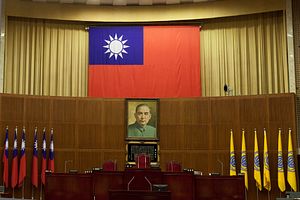The annual meeting of the World Health Assembly (WHA), the decision-making body of the World Health Organization (WHO), will run from May 22 to May 31 in Geneva. So far Taiwan, led by Tsai Ing-wen’s administration, has not received an invitation. Although the deadline for online registration to attend the WHA is already passed on May 8, Tsai’s administration is — or at least appears to be — still bidding hard for participation.
It is the first time in eight years that Taiwan has not been invited to attend the assembly. Facing the question of why WHA hasn’t invited Taiwan yet, WHO spokesman Christian Lindmeier explained in a way that couldn’t be clearer:
Cross-strait understanding between Taiwan and China has been the basis for the invitation for the Taiwanese representatives as observers since 2009. To my understanding, the understanding hasn’t been reached until now… To my understanding the ‘one China’ policy is a U.N.-wide accepted policy; Beijing is representing the one China.
At a press conference held on May 12, the head of WHO Governing Bodies Timothy Armstrong repeated that the current situation is because of “the absence of a cross-strait understanding.” But to make things look brighter, Armstrong added: “Negotiations are still ongoing. Anything is possible.”
If the WHO representatives could really speak plainly to Taiwan, they might have said this: “Come on, Taiwan. You know we are innocent; don’t push us anymore. Can’t you just reach an understanding with Beijing now rather than keep torturing us? ”
Unfortunately, Tsai Ing-wen just can’t. Instead of negotiating with an unwavering Beijing, the Tsai administration keeps pressing the WHO, the powerless scapegoat.
Tsai’s office has issued two announcements to call on the WHO to “recognize the fact that Taiwan is an integral part of the global disease prevention system and that the 23 million people of Taiwan have an inalienable right to equal treatment in health.” The announcement further argues, “Health is a human right, and disease prevention transcends national borders. ”
Taiwan’s Ministry of Foreign Affairs also published a strong statement, expressing “its strong dissatisfaction and great disappointment” to the WHO and condemning the WHO for “bowing to political pressure from a certain member by excluding Taiwan from the WHA.”
In fact, to anyone who is somewhat familiar with the history and evolution of the Cross-Strait Relations between Beijing and Taipei, the current farce is nothing but frustrating déjà vu.
A similar scene and dispute have been played again and again during Chen Shui-bian’s administration from 2000 to 2008. So when Ma Ying-jeou came into the Taiwanese presidential office and helped gain a ticket to participate in the WHA, the Brookings Institution claimed that “Taiwan’s participation—as an ‘observer’ under the name “Chinese Taipei”—at the 62nd WHA” marked “a significant development in Taiwan’s quest for international space.”
Now, whether the international space for Taiwan will shrink to the size it occupied nine years ago is a big question hanging over Tsai’s administration. Will the latest déjà vu be an overture of a new round of cross-strait confrontation? One hopes not.

































